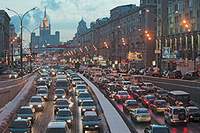Noise pollution in big cities deafens people and develops variety of diseases
On Monday Moscow City Duma was to consider several amends to Moscow’s “law on silence”. The members of the city parliament were planning to impose new restrictions on noisy work and increase fines for lawbreakers. Specialists at the Erisman Federal Center of Hygiene Studies recently measured noise levels on the streets of Moscow. Specialists returned a unanimous verdict: the big city noises are bad for your health.

“The noise levels in a metro car can reach up 85 decibels while the noise levels at metro stations can reach up an average of 110 decibels,” says Mikhail Serov, a specialist with an independent ecological inspection agency, in an interview to Izvestia. “A person exposed to such a noise for a long time may grow deaf. That’s why nearly all the engineers of metro locomotives suffer from hearing impairments,” adds Serov.
Those who spend more than 2 hours a day riding the metro are affected by several diseases and conditions that include vegetative vascular dystonia, heart failure, dyspepsia, and headaches, to mention just a few.
However, it is unlikely that you will find a quite haven in the city even if you stop using the metro. Izvestia already published a number of articles about the torment of the residents of Yuzhnoye Butovo who have to live next to a subway siding in that Moscow districts.
“Over there the noise produced by trains exceeds the maximum allowable levels by 6-16.3 decibels at daytime. They noise goes over the limit by 16-26.3 decibels at night,” says Olga Bobyleva, a researcher at the Center of Hygiene Studies. “The railroads of this type must be built at least 50 meters away from the residential area. We’re talking about the railroads built 30 meters away from the residential area. The point is that Butovo is not the only neighborhood affected by the problem. A widespread violation of the city planning requirements is a very serious problem. These days one out of two new apartment buildings is erected in close proximity to highways and railroads. In some cases a sidewalk is the only space that separates a highway and an apartment building. There’s no such thing as safety area,” says Bobyleva.
According to the city department of environmental management, more than 85% of Muscovites live in the areas of noise discomfort. The number is three times higher than an average number elsewhere in Russia. As a result, the incidence rate of progressing hearing impairments in Moscow is 20% higher than that in the Moscow region.
“Today the problem of congestion is relevant not only to Moscow’s major roads. It’s the problem of small back streets too,” says Mikhail Serov. “Exceeding the norm by 20-30 decibels has long become a commonplace. The situation in the center of Moscow is the worst. No plastic windows can save you from the roar coming from the outside,” adds Serov.
The city parks were thought to be a hideaway from the noisy highways in the past. Things have changed for the worse recently. According to ecologists, almost half of the city parks are unfit for taking quiet walks. The “black list” includes the Hermitage Gardens, Kuzminki Park, Gorky Park and another two dozen recreational areas in the center of Moscow. About 10% of all suburban areas are affected by exceedingly high noise pollution due to nearby airports.
The noise problem is not endemic to Moscow only. According to WHO data, Tokyo, Nagasaki and New York are the world’s noisiest cities. The noise levels in the above cities have long surpassed the 80-decibel limit.
The allowable daytime noise levels range from 55 decibels (overall levels) to 70 decibels (separate jumps); the allowable nighttime noise levels range from 45 decibels (overall levels) to 60 decibels (separate jumps).
The areas of noise discomfort are as follows:
Large construction sites and market places: up to 70 decibels;
Congested major highways: 60-70 decibels;
Traffic on a major highway: 70-80 decibels;
Moscow metro: 80-110 decibels;
Loud music pumping in a night club: up to 160 decibels.
Please bear in mind that an apartment looking on a courtyard is the best in terms of the noise factor. Make an effort and install an air conditioner if the windows of your apartment look on a major road. In this case you are strongly recommended to keep your windows shut most of the time. Replace the old window frames with new plastic windows if possible. Special Venetian soundproof blinds may help reduce the noise levels. According to doctors, only 30% of Muscovites can endure the city noises well.
The easily irritable majority are recommended to take walks in the open and do sports because physical exercises are an excellent means of falling into a deep sleep. You had better refrain from listening to your MP3 player while riding on the metro. A diet rich in vitamin E is essential for keeping your hearing in order. Wholegrain cereals, nuts and seeds, dark leafy vegetables, vegetable oils and eggs contain large quantities of the vitamin E.
Izvestia Nauki
Translated by Guerman Grachev
Pravda.ru
Subscribe to Pravda.Ru Telegram channel, Facebook, RSS!





